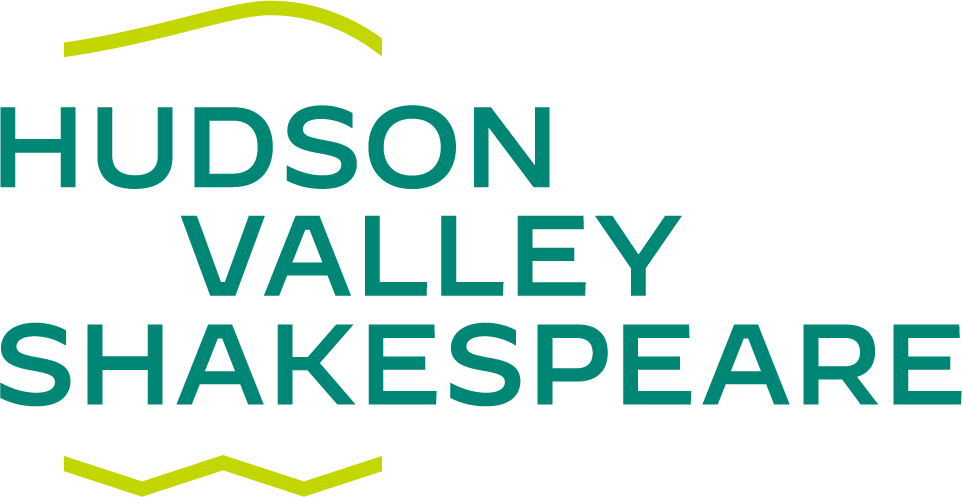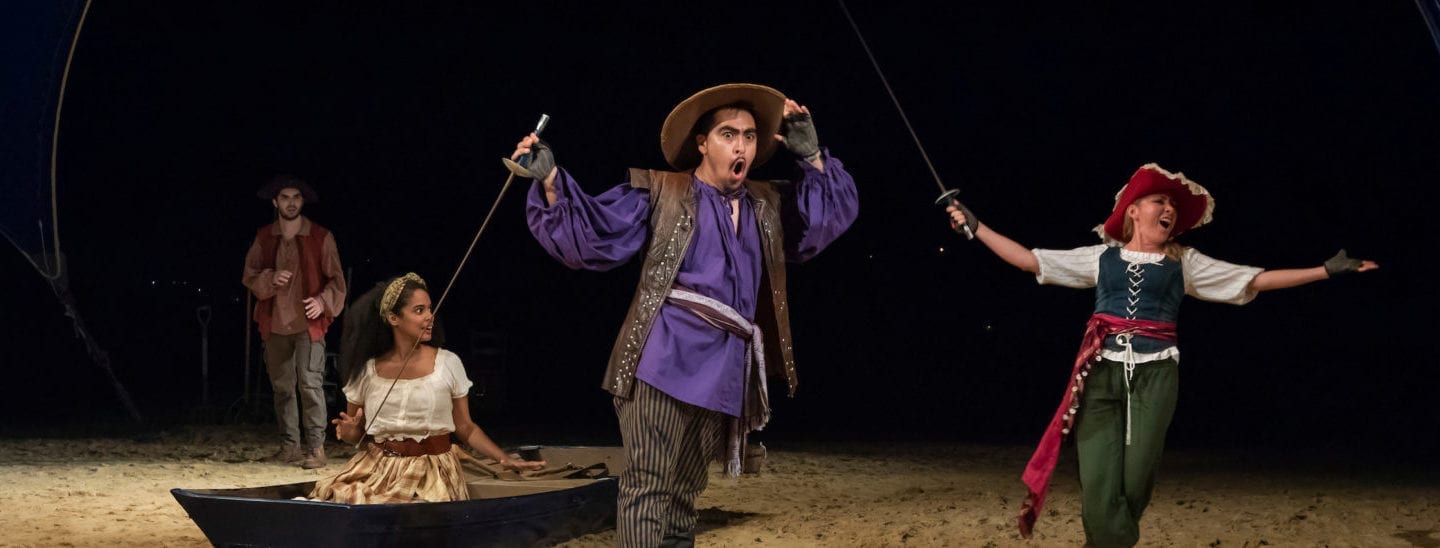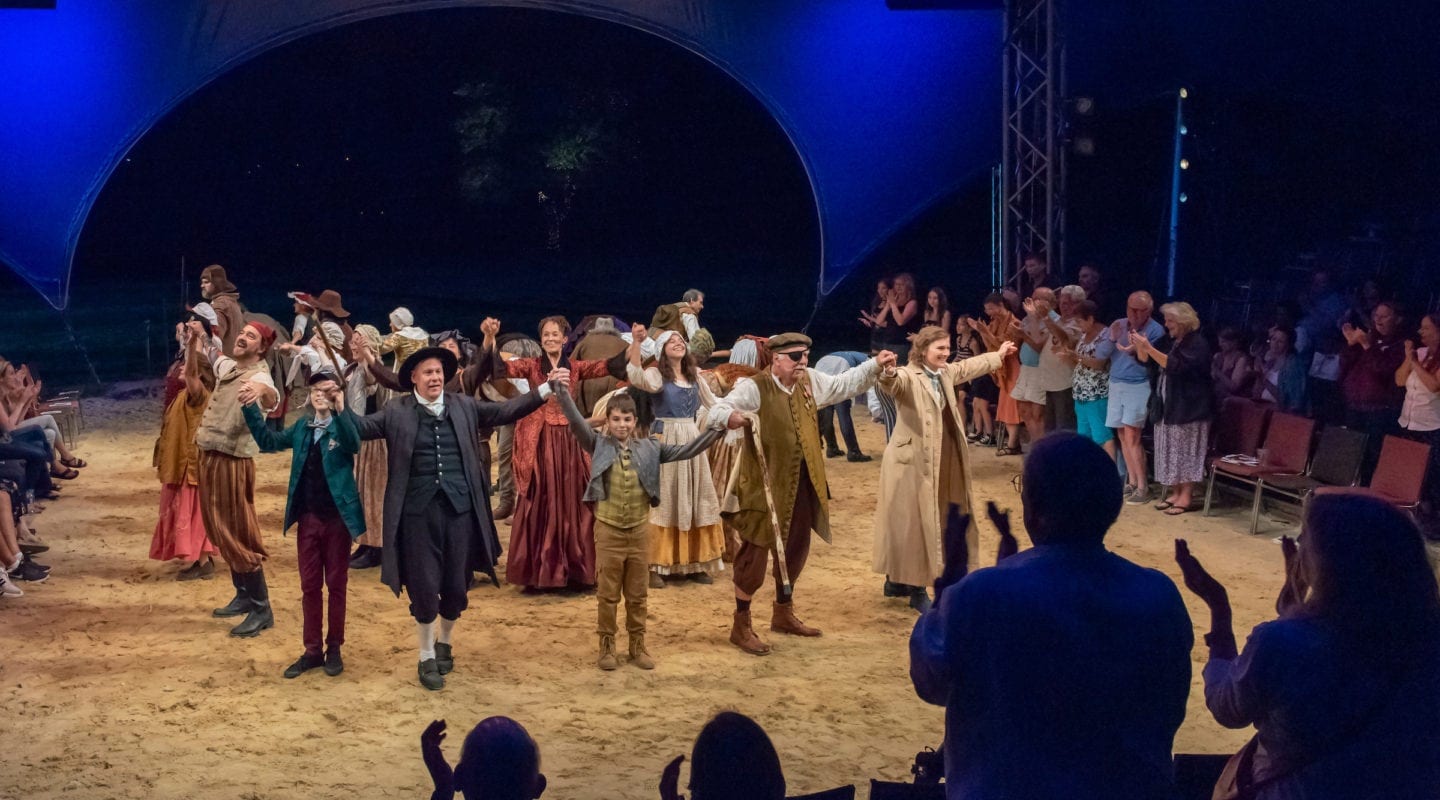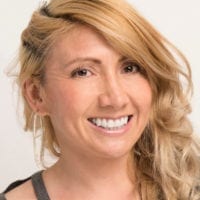M: Hello Roger, hello Yudy. Okay, First Question: Let’s talk about the roles that you both play in this production.
Y: Well, we play two roles in Rip Van Winkle: the demons, which you are familiar with, I’m sure–
R: — and the pirates! As the pirates we play with the audience and break the mood slightly.
M: Very entertaining! I wanted to know what attracted you to RIP VAN WINKLE. A lot of the people that are in this production are people from the community. So, what made you want to audition?
Y: Well, I saw the audition poster because we work with Safe Harbors in Newburgh and they advertised the Rip Van Winkle workshop, and I told Roger “WOW an audition for a production!” We were doing other things at the time and looking to get back into acting, so this was the perfect opportunity.
R: When we were in the workshop it was great because we felt like we were able to do a lot of things again, and at first we thought that it was just a workshop, or a few scenes here and there, and that’s it, but then they explained to us that it was an entire community production and we said we simply need to be there. And so I think that was the key point at which we said, “even if we can’t speak English, we don’t care. We’ll do anything. Tree number three, tree number four…” and that’s how it happened.
Y: And that’s how it happened.
M: It’s great that you came.
M: Let’s talk about where you live in the Hudson Valley.
Y: In Newburgh!
M: In Newburgh. And how did you settle on Newburgh?
Y: Well, it’s a long story. We are actors and producers. We have a theater company and we work in Colombia and Mexico and, well, for reasons pertaining to our career, we had to come here to ask for some assistance of this country in order to protect us.
R: Yes, so really we are here under political asylum. We’ve been working in this profession for many years and when we got to the US we had a friend living here in Newburgh and when we were looking for countries for political asylum we found that our friend was living in Newburgh. We didn’t know the city or the country, or anything really.
Y: We came to Newburgh to start again from ground zero.
M: Wow. Can you tell us more about the theater company that you had back in Colombia and the type of work that you do? It sounds very similar to what we’re doing here — engaging the community in the production and then having the community as an audience. You have neighbors coming to see their neighbors in the production and witnessing their story. Can you tell us a bit more about your work?
R: Yes, so we’ve been working with our producer for about six years, called ZOI Productions and we really do a lot of work in community theater and in Colombia that means working a lot in vulnerable areas, and so we brought theater to people in these areas. We also worked in Mexico, allying ourselves with various campaigns such as women’s rights, suicide awareness, and domestic violence, and others. What we would do is focus on a particular theme and put on a performance based on it, speaking almost directly to the public about what’s happening, making them laugh all while increasing their awareness for the cause at hand. That’s the magic of ZOI and that’s what we want to do with ZOI and that’s what we’ve been doing these past few years with them.
Y: We love — our passion is acting — and we love bringing art to people who cannot access it or go into a theater. Children, adults, anyone really–
R: –Rural people–
Y: Rural people, yes. We love going to these vulnerable communities. That’s what we did in Colombia and Mexico. Community theater…that’s how we lived.
M: Wow. It’s so important. I was saying earlier it’s so important to bring art to the everyone. It expresses to everyone what humanity is. So thank you, thank you for your work. So, in our production Rip Van Winkle, the character of “Dolph” leaves his home to seek himself, and “Sara” also leaves her home seeking adventure, and so does her father, and there are these stories of leaving one’s home and coming back to who they really are. Likewise, you have both left your homes. Can you tell us a bit about that? Do you feel at home?
R: Well, remembering one’s home always means remembering a lot of things: remembering friends, remembering family. We are very fortunate because this country has treated us very well. It has opened its arms to us. It hasn’t been easy, but it also hasn’t been too difficult. Well, I think the biggest thing we’ve learned is that everything happens for a reason and life is always giving you learning material and teaching you lessons… telling you that today you can have all of this, but tomorrow it might be gone, so make sure you enjoy the day today. So I think that remembering one’s home is — well, I can’t say that we necessarily wish we could be back home — but yes, we do remember our family a lot. And about Dolph and Sara: it’s exactly that. We’re living in this country which, in a way, is us looking for ourselves. It is recuperating our artistic style. We’ve learned that we have two options: give up everything or keep going and see what life throws at you.
Y: Yes, yes, exactly. This country has brought us so many adventures. Leaving our home, leaving the comfort of our home, leaving the comfort of our career. Like Roger said, this country has been excellent to us. The people, wonderful. We have found wonderful people here in the U.S. and I think that it has all been so enriching. It has enriched us as actors, and I think we’ve gotten to the point where we can write some good characters! ::laughs:: No, but really it has been enriching — every adventure, every job, every little thing that you’d never imagine yourself doing — well, you have to leave your comfort zone. You have to live. You have to eat. You have to be an artist. You have to do all these things, so yes, it has been quite the experience.
R: It’s been quite the challenge! Our challenge is had been keeping up with the new things that this country has been providing. Getting used to work here, getting used to social customs, the food — a lot has changed for us! So we’re going crazy finding ourselves once more–
Y: The language!
R: Yes the language!
Y: I got here without knowing a word of english. I didn’t know anything — not even the numbers. I never imagined that I would leave my country but it has been incredibly rewarding and enjoyable so far. Learning English, coming to a new place even if I don’t understand a word but doing what I love has been — well, I’m just incredibly thankful to the universe.
M: Yay universe! So, speaking of obstacles and challenges…I think the character that I play in the production, “Sara,” she’s a dreamer. She reads everything, she wants adventure, she dreams and dreams about what’s possible. She faces a lot of obstacles! She almost drowns twice, she deals with pirates, but she definitely has a lot of dreams. I’d like to know a little about what you both dream about accomplishing here and in your lives.
Y: I think that when you’re comfortable, at home, you THINK you have your career, your life made, your projects, a lot of dreams, but things move a little slower. I think that here it’s been a bit different because here in the U.S. it’s like “WOW!” You can dream a lot bigger. Things seem more tangible. For example, for me to have a theater career, to act in Hollywood — well, maybe not in Hollywood — but to have a career in theater in English and interpreting a role for myself, well, in Colombia that was a much more lofty goal. Here, it feels much more tangible. The theaters are bigger, and well, there are a lot of things that being in the US and having this adventure have made us dream bigger.
R: And one of our dreams that we want to accomplish soon, well maybe not soon ::laughs:: is to travel the world. We love to travel. We love to get to know new places and travel to specific corners of the world. We talk all the time about when we will be able to leave and travel because, well, at the moment we must stay inside the country for a bit. But when we can, we’d go to China, Japan, Australia, Patagonia–
Y: –to Thailand to see the Elephants!
R: We also have dreams as a couple to do grand things with community theater and support the community. We want to do larger projects, Broadway style, and well this is the kind of thing that we see as tangible here. If there is support for this, we can find actors, we can find producers, we can find a larger group to make it real. And really, just keep acting. I think it’s important to mention that in this country we really notice and came to feel the pride that an actor holds, the pride of an artist… A lot of times we are troubled, we are troubled for things out of our control. For example, we can be troubled by what feels like endless rehearsals, by the stress in our lives as actors. We have things in our lives that we take for granted and we don’t know how good we had it until they’re gone. Once those opportunities are gone you realize that “Wow, I would give anything to act again. I don’t care if I have to rehearse until 3:00am!” But they need to be taken away from you to realize “ah, okay, this is what I want in life.” So, really, if we both end up acting and living our lives around it, I think that would be a dream come true for us. Acting.
Y: Yes, exactly what Roger said. In Colombia, we would work for fifteen days at a time. Rehearsals at 7:00am, 7:00pm, work all day, and you’d be begging for it to stop because it felt terrible at the time. But here, we work the same schedule and do things we’ve never imagined we’d be doing, so it makes us evaluate what we had, what we have, and what we’ve learned. It makes us value acting so much more and it makes us value our career as artists.
M: Sometimes you have to lose something to know how much you valued it… Ok, so this production has some strong family themes. This family goes through some domestic issues, nothing too heavy, but they have their issues. The father is depressed, and they fight a lot, and the young girl is caught in the middle of it. But these decisions that are made… when he leaves, comes back, and decides that he’s changing for his family… The story is a lot about what family does and how family shows you your path. So I’d love to know a bit about how your families have shaped your paths.
Y: Wow. Well, my family has always been supportive 100% since I was a little girl. I’ve been acting my whole life and they’ve always supported me since. My family is the most important thing to me. My family is very small: my sister, my niece, my father and mother and my two dogs. And well, now I have my mother-in-law and Roger. So it is very small, but everything I do every day is entirely for them.
R: My family is much larger. My mother, my father, a lot of aunts, uncles, and cousins. I am an only child, I raised myself for the most part but all of my cousins were raised like brothers and sisters so that has made my family feel very large. I am one of the oldest cousins and so I am one of the older brothers, so to speak, and so we would always talk about what’s wrong, what happened at school, about their parents (my aunts and uncles). I love my mother and I love my father and they always supported me. My mother actually always told me, “study acting, study acting!” and my father always told me to study what I liked and never to do anything because I felt like I was obligated to. So for me, they were always my driving force. Now I have my in-laws whom I love and I get along with well. They are excellent people. I also have now my wife who’s been with me for some time through these adventures.
Y: Family is very important to us. It’s our motivation, as Roger says. It’s what makes us get up every morning and what makes us keep dreaming big. My family has always supported me — “we want to see you on TV, we want to see you in movies and in theater” they’d say, and so we’re truly going to miss them a lot during this production because they’re usually the ones right in the front row clapping. So this is a bit of a shock to not have them there, but we know that they’re back home supporting us. They’ve been fundamental to our career. Without their support, it wouldn’t be the same.
M: Mmmm. I wanted to share also with you both how similar the story of you both coming to the US is to that of my mother coming to this country and, well, to the story of a lot of people who have come to the US. I think it’s a very different story than that of our fellow castmates.
My mother is Dominican and because of the decisions that she made and the sacrifices that she made when she was very young, I was able to be born in Puerto Rico and live here and be an actor — all because of the difficult decisions that she made when she was young. When she was young she had a baby, and she decided to leave the baby in Santo Domingo, and took a small boat to Puerto Rico in the middle of the night. There she tried to get married to someone for citizenship and they ended up stealing all of her money and left. She was then deported. After that she decided to make another attempt. She got into another boat once again and made her way to Puerto Rico. There she met my father and because of those difficult decisions I am here, and my nieces and nephews are here. The US is a great country, but as you know it is very difficult. She still doesn’t speak English very well. She’s a little stubborn. She knows more than she’d like to admit but she doesn’t like speaking it. She lives in Miami and she’s also not going to be able to come see the production, but she’s always in my heart. Our families are always in our hearts.
M: So now that you’re here in Newburgh in a new community, how do you feel supported? Do you feel supported?
R: Yes.
Y: Yes. Very much.
R: We don’t know too many places in the Hudson Valley but we have seen that Newburgh carries a bit of a stigma when it comes to danger, crime, ugliness…but when we got here, we encountered so much support. We don’t have too many friends at the moment, but the ones that we do have taken care of us, they care about us, we do events with them and the community. Newburgh is full of opportunities to improve. There is so much to do in the community there. When there are problems in the community we shouldn’t look for guilty parties, we should instead teach adults how to solve their problems, teach children to pick up a notebook instead of a weapon. It’s all about teaching and improving, not blaming and stigmatizing a place as ugly and dangerous. So for us, what a lot of people see as a dangerous stigmatized town, we see as a town rich in opportunity for improvement, and we’re doing it step-by-step. We know that Newburgh will change, though, and when it does we will be able to help even more people. So yes, we definitely feel supported.
Y: Yes, for example this kind of production and programming that engages the community: for us, that’s a form of support. We get to do what we love again. That’s tremendour support. In Newburgh we’ve also found people that have helped us find work and get back on our feet. It really has been a place of opportunity and gratitude. We’ve been going step-by-step. It’s a process but everything that we’ve done so far is because doors have been opened for us without them knowing who we are or what we do. They’ve trusted us to become part of their community and that’s opened a tremendous amount of doors for us.
M: Yay Newburgh! Ok well now I’m going to ask you how you met! What’s the story of your origins?
R: Are we on year four or five?
Y: You don’t remember?! ::laughs:: Six.
R: Right, six. Six years ago I had to play a backup in one of the productions Yudy was in. When I got there I said, “Wow, how beautiful!” and I saw her there for the first time, we exchanged a few words here and there and that’s it. That was the first time we met. From there I went to Argentina for a year and it turns out that we shared a very good common friend. From there the three of us got together and started talking and doing projects together because we knew a lot of the same people and actors. From there, well, after a few months…I won!
Y: I made it difficult! It wasn’t easy! ::laughs:: Yeah, it was quite funny. During the production we were in I felt quite timid and then it became normal and we started talking. From there Roger was really the one that created ZOI Productions. He had already formed the company with a group of friends and colleagues, but that didn’t work and it disbanded and Roger was left with his baby, ZOI. From there we started working together, studied production together, and started putting out a lot of projects. Other events then happened which would eventually require us to come to this country but we were always working together.
R: That’s the funny thing: of the four years that we’ve been together, we’ve always worked together. Even in jobs that have nothing to do with acting!
Y: We always end up working together.
R: So just how it started with the productions we worked on, that’s how it’s been ever since.
Y: We enjoy each other’s company. Having two artists as a couple helps us complement each other and we’re great friends. So when we have our artistic “crises,” we support each other very well. We’ve very happy together.
R: Together 24/7, 24/7 — we’re together all the time. People ask, “Don’t you get bored from being together all the time?” and no, we don’t. We get coffee, we talk a couple hours, then we have a beer and talk for another couple hours, then we watch a movie. That’s in our free time. But then we get to work.
Y: We enjoy it a lot.




